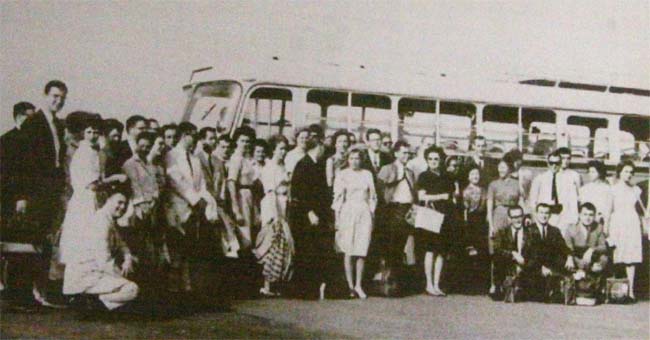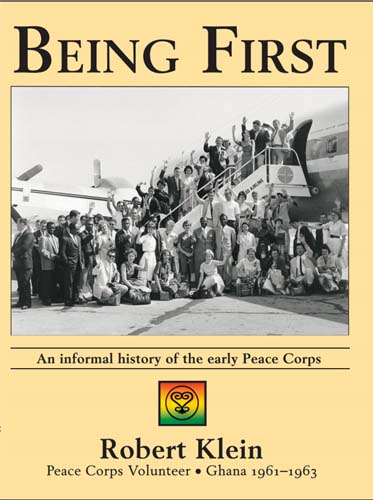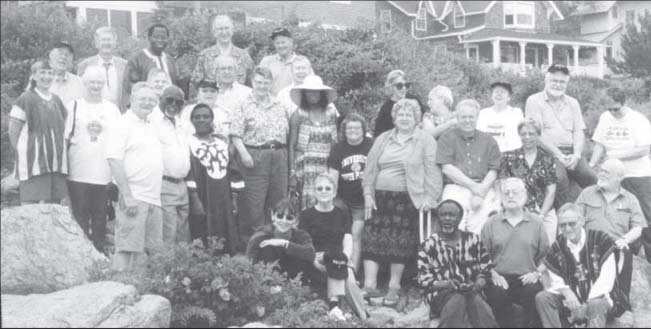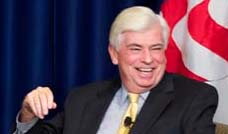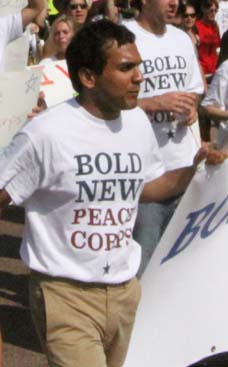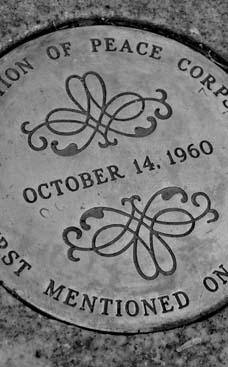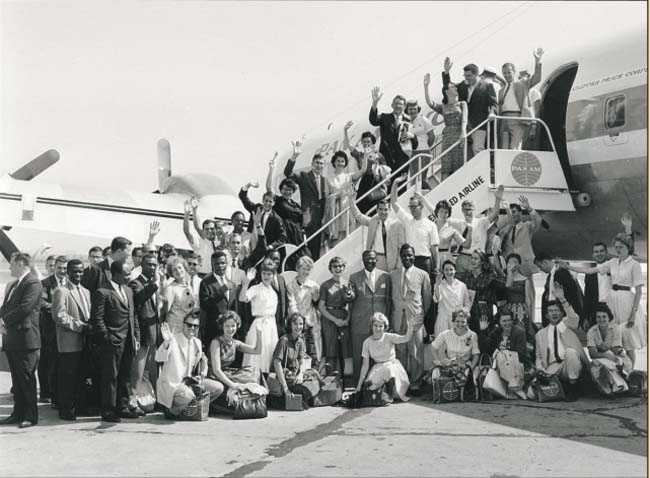
That the "future of the Peace Corps" really depended on us had been stressed by Shriver earlier in the day when he spoke to us at a perfunctory State Department "briefing" which seemed designed to reassure the briefers, not especially to inform us. He told us, "The President is counting on you. It's up to you to prove that the concepts and ideals of the American Revolution are still alive. Foreigners think we're fat, dumb and happy over here. They don't think we've got the stuff to make personal sacrifices for our way of life. You must show them. And if you don't, you'll be yanked out of the ball game." We had faced eerie psychiatrists, seven varieties of psychological tests, chilling stories of boa constrictor attacks, and the perils of partying in Strawberry Canyon above the Berkeley campus (I never knew they produced such large bottles of wine). Shriver could not daunt us. We were ready- to teach, if not to sacrifice.
Bob Klein writes "Being First" about the First Group of Peace Corps Volunteers to go Overseas in 1961
HERE TODAY, GHANA TOMORROW
Meeting President Kennedy
After the discomfort of the selection process, we were glad that training had been shortened by one week, ending on August 21. We were to report to Washington on Monday, August 28, for a White House event and then board our Pan Am charter to Accra. As early as July 23, I had written home:
"Good news! Our training program is being shortened by one week and we are being given leave from August 21 to August 28." And added in a later letter, "We are being flown to Ghana by chartered plane from Washington and will be allowed up to 216 pounds of luggage [Why 216?]. We have to report to Washington by 11 a.m. on August 28… There are rumors of a White House reception."
I remember envisioning a White House reception, based on earlier experiences at various bar mitzvah and wedding receptions. I expected a high class lawn party setting with gloved waiters in crisp white vests, circulating among us with canapés and drinks; we'd have an opportunity for casual ‘cocktail party' chatter with the President, Shriver, maybe even Jackie. I was not alone in such thinking. Ruth Whitney said: "Georgianna and I wore our basic black dresses-now we kid about it all the time-and white gloves. She and I must have grown up with the same kind of mother who taught us what to wear for such occasions."
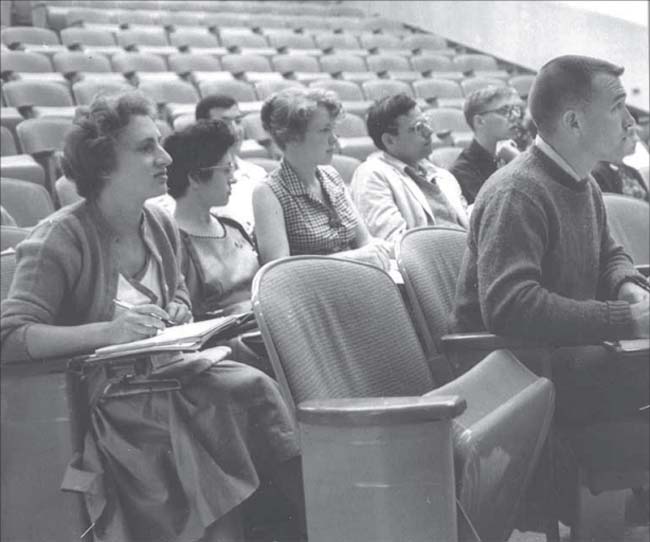
Caption: Members of Ghana I in training at Berkeley.
I think Peace Corps/Washington was content to reward us with a few days at home before the overseas adventure began. It could also serve other purposes: as of August, the Peace Corps legislation was working its way through Congress. Having us in our hometowns could and did generate local news stories such as: "Young Wilmette Man Leaves For Ghana"; "Graduate To Teach with Peace Corps in Ghana"; "Miss Vellenga In Ghana, West Africa" [in the Social News from a really local paper]; "Plainfield Teacher Chosen for Peace Corps in Ghana." We scattered from Berkeley for the brief leave to say goodbye to family and friends (and to buy our weight allowance of 216 pounds of clothing and supplies, trying to figure out how many handkerchiefs would be needed for two years).
Surely the most memorable of farewells was the one described by Alice O'Grady. She had continued through training to perform on weekends with a musical troupe, the Lamplighters, which was presenting Gilbert and Sullivan's ‘The Mikado': "We did a show that night I left for Chicago. The director, who was also in the cast, at the end of each performance would step forward and say, ‘Thank you for being such a good audience; we would like you to join the cast in the lobby for coffee.' That night she said, ‘We're not able to join you in the lobby because one of our members is going overseas with the Peace Corps' and I stepped forward and had my first and only solo bow with that company. Got a nice round of applause. Then, because the plane was leaving soon, I changed but none of the cast did. They all went to the airport as Japanese schoolgirls, etc.-in their costumes. When they called the plane and I was about to leave, they all went down on one knee and sang ‘Hail Poetry.' It was just beautiful. It's a lovely kind of hymn; not from ‘The Mikado.' They presented me with a hobby horse, a horse's head on a stick, for me to travel to Ghana on. It was a very touching sendoff." [1997]
The Peace Corps program of road surveyors for Tanganyika was completing phase one of its training in El Paso at about the same time. The second phase was to be field training at a special camp in Puerto Rico. In transit between the two sites, they joined the Ghana group for a day in Washington. The White House setting, remarks by Kennedy, and approximately 75 bright, young, newly minted Peace Corps Volunteers would attract useful press coverage. The White House reception was in the Rose Garden, a very crowded stand-up affair on the hottest day of the year, with reporters and photographers outnumbering guests, but we did get to meet President Kennedy. It must have been a heart-warming sight to those lobbying for passage of the Peace Corps bill. Kennedy appeared with Shriver hovering near and spoke to us. Many of the group best remember Kennedy's remark: "So I hope you realize-I know you do-that the future of the Peace Corps really rests with you." We were comfortable with that, thanks to Apter, Drake, and the others at Berkeley.
That the "future of the Peace Corps" really depended on us had been stressed by Shriver earlier in the day when he spoke to us at a perfunctory State Department "briefing" which seemed designed to reassure the briefers, not especially to inform us. He told us, "The President is counting on you. It's up to you to prove that the concepts and ideals of the American Revolution are still alive. Foreigners think we're fat, dumb and happy over here. They don't think we've got the stuff to make personal sacrifices for our way of life. You must show them. And if you don't, you'll be yanked out of the ball game." We had faced eerie psychiatrists, seven varieties of psychological tests, chilling stories of boa constrictor attacks, and the perils of partying in Strawberry Canyon above the Berkeley campus (I never knew they produced such large bottles of wine). Shriver could not daunt us. We were ready- to teach, if not to sacrifice.
I must have been mulling over Shriver's exhortation because at the Rose Garden I was interviewed by Tom Wicker of The New York Times (in my mind that made up for the hiding, bearded, in the back row of all those photos). He wrote:
"Robert Klein … made it clear, however, that he and his fellow corpsmen had not been trained as political missionaries or assigned to preach particular doctrines.
He said that David Apter, a political science professor who headed the four-man faculty for the Ghana group's two months of training at the University of California, had stressed that each volunteer was going abroad as an ‘individual with his own ideas.' "
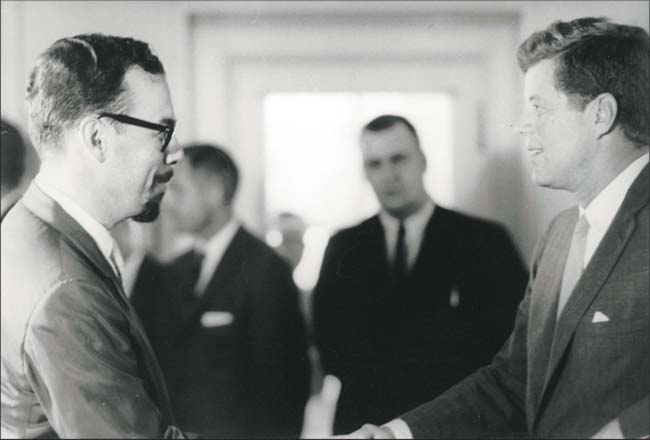
Caption: Ghana I PCV Robert Klein meets JFK in the Oval Office.
After the Rose Garden speech, President Kennedy, in a stage whisper, had asked an aide how busy his schedule was because he wanted to greet each of us individually. He retired to the Oval Office and we paraded through, single file. Everyone has some memory of that part of the occasion. Don Groff recalled, "I remember just being kind of dumbstruck, going through the line. I do remember that I shook Kennedy's hand; as I moved on, he said, ‘Ghan-err or Tanganyika?' And I told him, ‘Ghan-uh.' "
For Nate Gross, it was a storybook experience with this special history:
"I discovered the existence of Jack Kennedy in an interesting way. In 1958 at college I was trying to go to sleep after staying up late studying and had the radio on. The music changed over to a talk program. I was half asleep but it was someone interviewing a politician. I noticed a New England accent. I was about to turn it off and go to sleep but the guy was answering in such an intelligent way that I wound up listening for an hour. I wanted to find out who was this politician actually talking so intelligently. It turned out to be Jack Kennedy. Later in 1959 he came to a convocation at Beloit College. Jackie was with him with her classic A line dress and pill-box hat. He gave a great little talk there. I later got to shake his hand during the Wisconsin primary. So I had great feelings toward Kennedy before Peace Corps. It was really wonderful to be at the White House even though in the receiving line the exchange was perfunctory. We didn't have any conversation. He just said ‘Good luck' and shook my hand. I think some people had a few sentences." I interjected: "Newell did." Kiddingly, Nate responded: "He probably mentioned family friends." [1997]
In fact Newell did just that. He was the last in the reception line and said to President Kennedy, " ‘I'm from Massachusetts too. And my brother was actually a roommate with your brother [Teddy] in college.' Then I said, ‘I just want to say something myself. You've been under a lot of criticism, skepticism about Peace Corps. We're going to serve you well.' " As an aside, in our interview many years later, Newell said that he felt the comment was a bit ‘saccharine.' [1997]
DeeDee Vellenga commented about the Rose Garden in her diary. DeeDee was a graduate of Monmouth College in Illinois and had taught for several years at Foxcroft, an exclusive school for girls in Virginia. We were not particularly close friends during training or in our early days in Ghana. We shared the common experience of being volunteers in Ghana I but little else. It was probably my New Yorker provincialism that exaggerated the distance between Junior High 136 in Harlem and Foxcroft and those who teach therein.
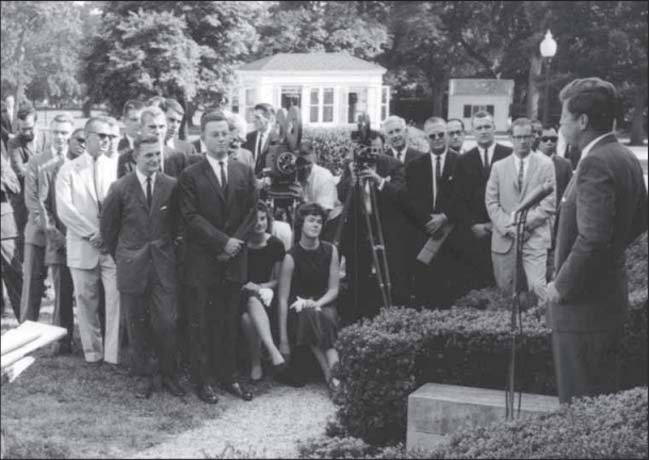
Caption: Members of Ghana I and Tanganyika I in the White House Rose Garden with President Kennedy.
DeeDee wrote: "The Rose Garden reception was unbelievably hot and confused with reporters, cameramen, wires, tape recorders all over the place. When Kennedy did try to meet us informally after his brief message, he was swamped so it was decided to let us file through his oval office and shake hands with him-I couldn't think of a thing to say to him-all I noticed was his piercing blue eyes. He paused for a moment and looked hard at me and then said, ‘Good luck'-didn't know quite how to it! Meeting Shriver was very encouraging-he is down-to-earth and very dynamic in a gutsy sort of way. I think the Peace Corps has a real future if he continues to head it. Now it's up to us to see how things go in the field!"
The Washington whirl continued for us that evening with a party at the residence of the Ghanaian Ambassador, Mr. W. Q. Halm. Looking back it is remembered as a wonderful, hot and steamy introduction to Ghanaian hospitality. The Ambassador assured us that it never got as hot and humid in Ghana as it did in Washington D.C. We danced, ate, and drank for tomorrow we were, not to die, but to fly into the unknown of Ghana. After the Embassy party, Jim Kelly, Maureen Pyne, Ruth Whitney, and George Coyne (telling the story): "… went to a night club and then caught a taxi. We went to the Shrine of the Immaculate Conception. We wanted to say a prayer because we really didn't know what we were getting into and we wanted to light a candle. The cathedral was in complete darkness and we had to light matches to find the door but were able to get in."
It's reassuring that at least four of the group knew enough not to just curse the darkness but to light a candle. They were ready for whatever Ghana might bring.
